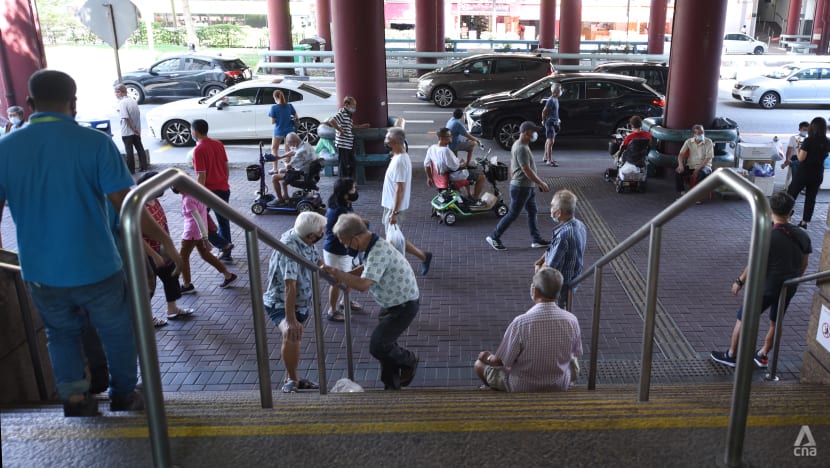Chipping away at the mystery of immortality: The race to cheat death as populations age in Asia
In the first of a four-part series that explores the idea of living longer, CNA’s Dawn Tan looks at some of the science surrounding reversing ageing in Asia.

In this file photo, elderly people are seen in Chinatown. (File photo: CNA/Calvin Oh)
SINGAPORE: As Asia ages faster than any other region in the world, the race is on to find ways to slow down the process.
There are now 630 million people aged 60 years and above in Asia Pacific, representing 60 per cent of the world's older population. By 2050, that number is projected to increase to 1.3 billion.
The research in longevity has advanced to the point of several potential interventions mostly in animal models that might work in humans, said Prof Brian Kennedy, director of the Centre for Healthy longevity, under Singapore’s National University Health System.
“People are starting to think: ‘Wait a minute. Maybe we can slow down or even reverse some aspects of ageing’. The opportunities are now there to really target human ageing,” he said.
“We've thought for a long time (if) it's going to be possible to slow ageing. But I think the tools are in place,” added Prof Kennedy, who is also chief scientific officer at Regenosis, a firm that aims to counter ageing through customised programmes.
Mr Shaun Lim, chief executive and co-founder of Regenosis, described a World Health Organization classification of ageing as a medical condition in 2018, as a “surprising” development.
It means that “ageing is not natural as most of us think”, he said.
“There are thousands of researchers going into every aspect of how to reverse ageing at this moment,” he said.
“In reverse ageing, we're talking about new possibilities,” he added. These include a person feeling and looking young again, he said.
NO LACK OF TRYING
Finding a way out of the ageing process is not new.
For thousands of years, since the time of the ancient Egyptians and Emperor Qin Shi Huang of the ancient Chinese Qin dynasty, humans have had a “preoccupation of finding the pill for immortality”, said Prof William Hwang, head of the SingHealth Duke-NUS Cell Therapy Centre.
“Everyone feared getting old and the consequences of ageing,” he said.
While such consequences of getting older are at the core of the race to develop drugs and therapies to halt or even reverse the process, ageing is not a disease that needs to be fixed, said Prof Hwang.
“If ageing was a disease, then life would be a terminal illness, because we all age,” he said.
“However, ageing does result in accumulated genetic mutations and damages to the cells, and that results in consequences of ageing that lead to disease, for example, failure of the heart, failure of the kidneys, of other organs, and those need to be addressed.”
GAME-CHANGING RESEARCH
Part of the game-changing research in the field is on telomeres, which can play a critical role in protecting DNA from environmental damage like stress, pollution, and diet.
Prof Hwang, who is also chief executive of the National Cancer Centre Singapore, explained that telomeres - DNA sequences at the ends of chromosomes - may act as barriers to damage. He likened telomeres to the ends of shoelaces.
“These are like the caps at the ends of the shoelaces to prevent the shoelaces from getting frayed, from getting disentangled. So, the cells would have to undergo a little bit of damage to the telomeres before the important genes start to get affected,” he said.
Prof Hwang added that longer telomeres help to protect cells against damage to the important genes and chromosomes. Shorter telomeres, on the other hand, may make people more prone to age-related illnesses.
SICK YEARS
A rise in age-related sick years in the Asia Pacific has countries worried.
“We are living longer. But we are losing on average 10 good years. So that alone is enough for us to sit up,” said Professor of Sociology at Singapore Management University Paulin Straughan.
The problem right now is that life span is going up faster than health span, said Prof Kennedy.
“That period when people are sick is widening and that's where all the health care costs are. That's where all the quality of life problems are. That's where all the challenges are,” he said.
Too many years of sick care is an economic quandary, with fewer healthy older people who are still employable posing a massive risk to Asia's economic muscle.
As governments in Asia pore over the issue of an ageing population, preventative medicine is one available route.
“It used to be reactive medicine, meaning that (if) you get sick, you go see a doctor. Now the whole world, every government, we are all moving in the direction of how to not see a doctor and that is a better move,” said Mr Lim.


















